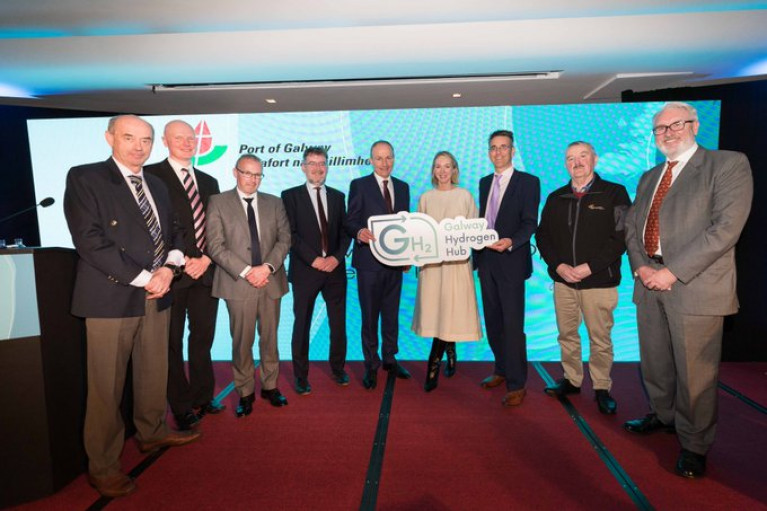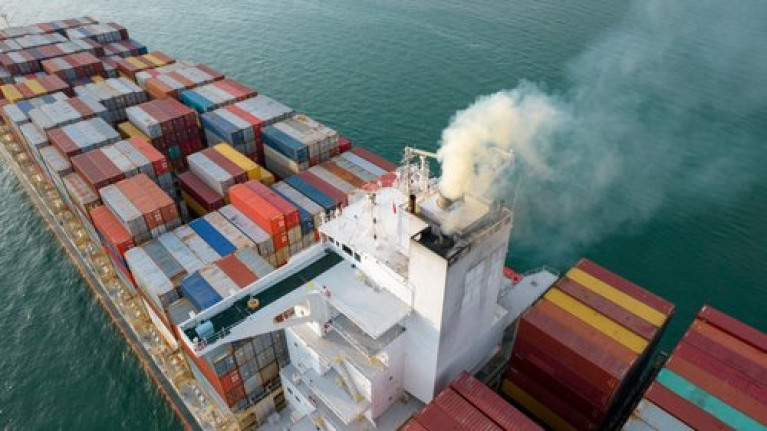Displaying items by tag: Zero Emissions
Belfast Lough’s Artemis Technologies Unveil ‘World’s Most Advanced’ Electric Passenger Ferry
Leading maritime design and applied technologies company Artemis Technologies has unveiled the design of its new fully electric EF-24 Passenger vessel, targeting the global high-speed ferry market.
And it’s set to make its debut in 2024 on a route between Belfast and Bangor on Belfast Lough.
The ferry is among several zero-emission vessels being developed by the Northern Ireland-based Artemis Technologies, designed to provide commercially viable green transport solutions for operators, cities and governments across the world.
With a top speed of 38 knots, the EF-24 Passenger ferry offers a range of 115 nautical miles at a 25 knots cruise speed and produces fuel savings of up to 85% compared to conventional high-speed diesel ferries.
Powered by the patented Artemis eFoiler electric propulsion system, the 24m vessels will fly above the water, providing a comfortable ride for up to 150 passengers on board, mitigating effects of seasickness and producing minimal wake at high-speed, significantly reducing the impact on shorelines.
Introducing the EF-24 Passenger, Artemis Technologies’ chief executive Dr Iain Percy OBE said: “We have combined our experience from the worlds of high-performance sailing, motorsports, aerospace, and advanced manufacturing to design and develop an electric propulsion system that is quite simply a game changer for the maritime industry.
 The EF 24 Passenger is being touted as a commercially viable green transport solution for operators, cities and governments across the world | Credit: Artemis Technologies
The EF 24 Passenger is being touted as a commercially viable green transport solution for operators, cities and governments across the world | Credit: Artemis Technologies
“Our high-speed passenger ferry provides a cost-effective public transport solution that helps address air pollution, congestion, and noise.
“By encouraging multimodal transport in urban areas, we will enable cities around the world to utilise and benefit from the untapped potential of their waterways.
“With hydrofoils that lift the boats out of the water, we are dramatically reducing drag. This is coupled with a submerged electric drivetrain that is exceptionally efficient, as proven through rigorous testing with our 12m eFoiler workboat, validating our digital simulations and performance prediction.”
Artemis Technologies promises that the ferries will be fully accessible and spacious with a range of facilities on board including bike racks, cabin bag and overhead storage, baby changing facilities and charging points.
The vessels will also feature a high-speed collision avoidance system developed with ECIT, part of Queen’s University Belfast. The system will ensure the safety of operations in port and close to shore by safely diverting the ferry on an altered path away from sea life, wildlife, debris and other in-water objects that might otherwise be obscured from view.
Artemis Technologies has partnered with Condor Ferries to operate a pilot scheme using the first EF-24 Passenger ferry. This will come into service in 2024, running between Belfast and Bangor in Northern Ireland.
Percy added: “The zero-emission ferry that will be seen departing Belfast in 2024, aptly named ‘Zero’, will be the first we build at our manufacturing hub in the city, but it is only the start.
“Many water-based cities around the world are grappling with the challenge of growing populations, congestion, and pollution. The EF-24 Passenger can provide an immediate green transport solution that competes economically with road and rail in places like San Francisco, New York, Venice, Istanbul, Dubai and Singapore – anywhere around the globe that is seeking sustainable transport alternatives that balance the requirement for people to continue to move around with the need to reduce carbon emissions.
“Especially where new infrastructure is required like a new road or rail line, this ferry will not only be the cheapest, but also the fastest and least disruptive way to decarbonise transport networks in water-based cities.”
John Napton, CEO of Condor Ferries, added: “Green vessels like the EF-24 Passenger ferry perfectly provide that clean alternative to traditional diesel ferries. We are thrilled to partner with Artemis Technologies and the Belfast Maritime Consortium to develop these vessels from concept to reality over the coming months and look forward to being the first operator to set sail in 2024 with the world’s most advanced zero-emission foiling fast ferry.”
Earlier this year, Artemis Technologies launched the world’s largest 100% electric foiling vessel, Pioneer of Belfast, and unveiled an electric workboat range including a 12m multi-purpose workboat and a 12m crew transfer vessel with a 24m crew transfer vessel also currently under development.
At an event taking place today is to announce details of Ireland’s first “Hydrogen Valley” earmarked for development in Galway Harbour located near to the city centre.
As Connacht Tribune reports the major zero-emissions fuel facility will be located at the Harbour and will research, produce and use renewable hydrogen gas.
It’s led by Galway Hydrogen Hub – or GH2 – which is a consortium of national and local stakeholders.
The meeting to unveil the vision for the project will take place at NUI Galway this afternoon at 2.
John O’Sullivan, SSE Renewables’ Project Manager for GH2 says the project will bring many benefits to the city.
As Afloat previously reported An Taoiseach Micheál Martin endorsed plans for Galway to become the State's first "hydrogen hub".
UK Calls for Zero Global Shipping Emissions by 2050 As Greenest Ever LISW Begins
At the greenest London International Shipping Week (see story), the UK backs a world leading absolute zero target for international shipping emissions by 2050, the Transport Secretary Grant Shapps has announced.
This target, which would need to be agreed through the International Maritime Organization, would be a significant increase of ambition for the sector, which is currently accountable for 3% of global emissions.
The announcement yesterday comes as the British Government launches the greenest ever London International Shipping Week (LISW), building on a string of initiatives aimed at slashing emissions and establishing the UK as international leaders in green maritime.
- UK to push for international shipping emissions to reach absolute zero by 2050
- Transport Secretary sets out ambitious global 2050 target as UK Government launches greenest ever International Shipping Week
- Vision of zero emission vessels entering into commercial service by 2025 opening the possibility for cleaner and greener channel crossings in the next decade
At a speech tomorrow, the Transport Secretary will announce the winners of the multimillion pound Clean Maritime Demonstration Competition, focused on innovative green maritime solutions, launched as part of the Prime Minister’s Ten-Point plan for a green industrial revolution last November.
He is also expected to reassert the importance of building a thriving maritime sector focused on innovation, highlighting his ambition to have zero emission vessels entering into commercial service by 2025 which opens the possibility for cleaner and greener channel crossings in the next decade.
These initiatives follow on from commitments outlined in the world-leading Transport Decarbonisation Plan to explore the establishment of a UK Shipping Office for Reducing Emissions (UK SHORE), a dedicated unit within the Department for Transport focused on decarbonising the maritime sector.
Transport Secretary, Grant Shapps said: “As a maritime nation with a rich history, and host of COP26 this year, we are proud to be at the forefront of the greener era for maritime, charting an international course for the future of clean shipping.
“I’m incredibly excited by the changes happening in this sector, with the speed of progress highlighted by the prospect of zero emission commercial vessels in UK waters in the next few years and green Channel crossings within a decade.
“Taking action now allows us to lead the charge on this global shift, creating highly-skilled jobs for British workers and shaping the landscape for what clean shipping and trade will look like for future generations.”
As the greenest shipping week to date, the UK is focused on working in collaboration with the sector to build a strong sustainable future for UK maritime. As recently published in the intergovernmental panel on climate change report, warming is happening quicker than previously estimated, therefore action is needed across all sectors and the UK will do all it can to slash emissions from shipping.
Throughout the week Ministers and industry will be leading a host of events taking stock of the sector’s progress:
Kicking off with a Ministerial roundtable at the Foreign Office on Monday 13 September, leaders from across the sector will discuss how to level up all parts of the UK with a focus on its decarbonisation, coastal communities and port towns and industries.
The Department will publish its Biennial Report on Tuesday, outlining the strength of the sector, the next phase for its recovery from the pandemic, and progress on our ambitious Maritime 2050 strategy.
On Wednesday the Transport Secretary will announce the winners of the Clean Maritime Demonstration Competition, while the Maritime Minister, Robert Courts will be at Port of Southampton opening the newest cruise terminal which is the greenest one yet.
Minister Courts is also set to take centre stage on Thursday Evening at the coveted Gala Dinner in the iconic National Maritime Museum in Greenwich, the heart of British maritime, where he will outline the future for UK maritime and the opportunities that exist as we build global trading networks.
The week will be rounded off with the Maritime Minister joining Mersey Maritime at the end of the week for its annual Awards event, where he will present the DfT Maritime 2050 Award – celebrating industry action towards our shared Maritime 2050 ambitions.
European Partnership Aims to Make Zero-Emission Waterborne Transport a Reality Before 2050
The European Commission and the Waterborne Technology Platform have signed a Memorandum of Understanding (MoU) for a co-programmed partnership under Horizon Europe aimed at making zero-emission maritime transport a reality within the next 30 years.
The partnership aims at leading and accelerating the transformation of waterborne transport (maritime transport and inland navigation) to eliminate all harmful environmental emissions (including greenhouse gas, air and water pollutants) through innovative technologies and operation.
By 2030, the objective is to develop and demonstrate deployable zero-emission solutions which are applicable for all main ship types and services, to enable the achievement of zero-emission waterborne transport by 2050.
The European Commission will invest up to €530 million to fund actions within the scope of the Co-programmed European Partnership. It’s also expected that private sector partners will invest up to €3.3 billion between now and 2030 in research, innovation and other priorities towards the partnership’s objectives.
Speaking after of the ceremony in Brussels yesterday (Wednesday 23 June) held as part of the European Research and Innovation Days, chairman of the Waterborne Technology Platform, Henk Prins said: “Today is a unique moment for the European waterborne transport sector, which is a strategically important sector for the EU. The partnership will not only foster and accelerate the transition to an environmental-friendly mode of transport, in line with the European Green Deal ambitions, but it will also stimulate the green recovery of the waterborne sector.
“The partnership uniquely gathers all relevant stakeholders from the waterborne transport sector, who join forces to deliver innovative solutions for the benefit of future generations. We look forward to the applications for the first round of calls for proposals, as well as mapping the state-of-play and monitoring the progress towards reaching our objectives.”
The Waterborne Technology Platform has been set up as an industry-oriented platform to establish a continuous dialogue between all waterborne stakeholders, such as classification societies, shipbuilders, shipowners, maritime equipment manufacturers, infrastructure and service providers, universities or research institutes, and with the EU institutions, including member states.
It comprises members and associated members from both maritime and inland navigation countries, representing about 18 EU member states. In addition, the Associations member of the Waterborne Technology Platform represent the broader waterborne sector throughout the entire EU.































































